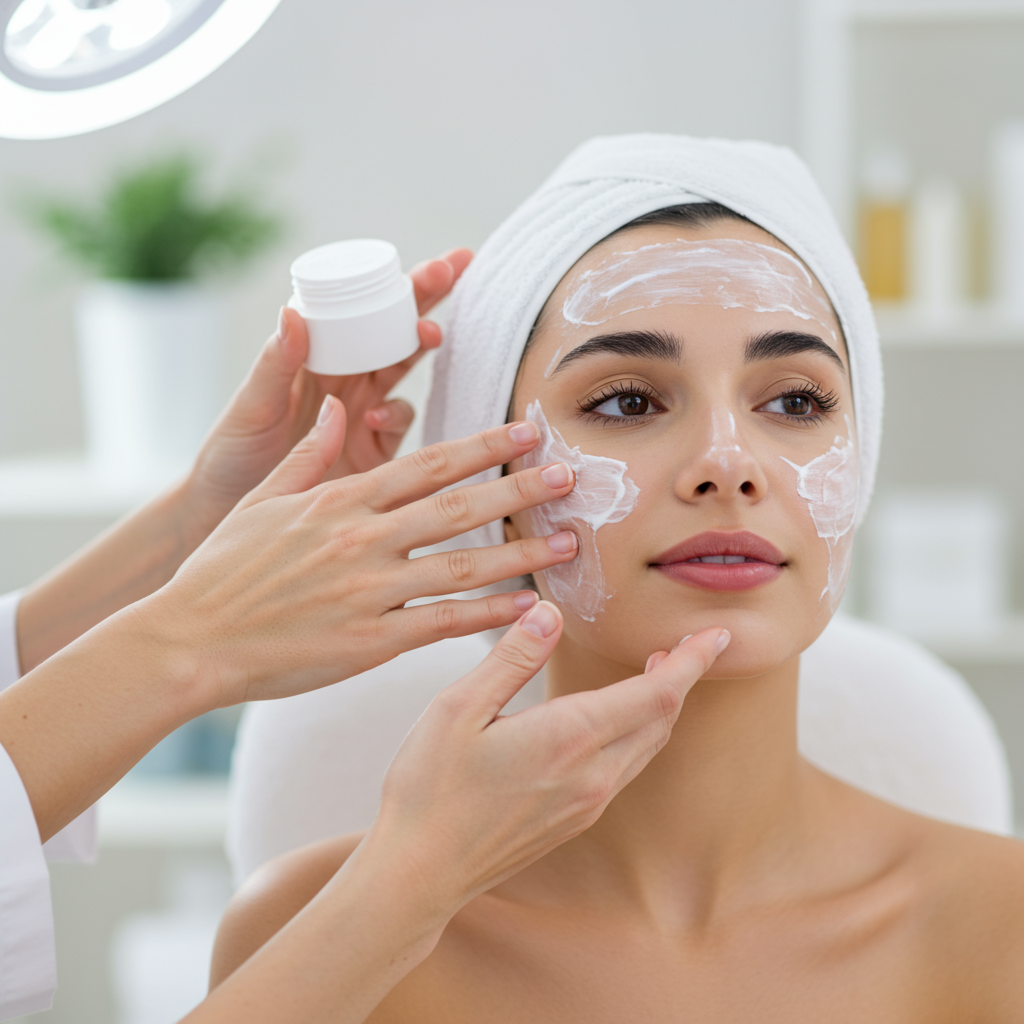
Table of Contents
Introduction
Have you ever experienced the frustration of your skin turning red, itchy, or irritated after trying a new skincare product? If you have sensitive skin, finding the right products that soothe rather than aggravate your complexion can often feel like navigating a minefield. Sensitive skin is a common concern that affects many people globally, and the importance of choosing the right skincare products to maintain skin health cannot be overstated.
Understanding sensitive skin is crucial because it reacts more intensely to environmental factors and product ingredients that are generally well tolerated by other skin types. In fact, studies suggest that approximately 60% of women consider themselves to have sensitive skin at some point in their lives. This heightened reactivity can cause redness, dryness, discomfort, and sometimes a persistent burning or stinging sensation, making daily skincare routines a challenge. Without the right product choices, sensitive skin can become inflamed, leading to long-term damage and discomfort.
For many, the struggle is not just about managing symptoms but about feeling confident in their own skin every day. The emotional toll of dealing with flare-ups or visible irritation can impact self-esteem and overall well-being. It’s important to remember that sensitive skin is a unique condition that requires special care and attention. By selecting suitable skincare products, you can nurture your skin’s barrier, reduce sensitivity, and enjoy a healthy, radiant complexion. Whether you are new to this or have been managing sensitive skin for years, knowing how to choose the right products makes all the difference.
If you’re new to this topic, you might want to start with skincare routines for glowing skin to build a foundational understanding that complements managing sensitive skin. Many people also wonder about safe remedies like homemade face masks for glowing skin, which play a crucial role in gentle, natural care without harsh chemicals. These linked articles provide helpful guidance and solutions that align well with the unique needs of sensitive skin.
In this comprehensive guide, we are going to explore essential knowledge and practical tips for choosing and caring for skincare products specifically formulated for sensitive skin. Skin health is a journey where informed choices lead to lasting benefits and comfort. Having the right products tailored to your skin’s needs can transform your routine from a source of worry into a nurturing self-care ritual.
What You’ll Learn in This Guide
In this guide, we will walk you through everything you need to know about selecting and using skincare products for sensitive skin. Here’s what we’ll cover:
- Understanding Sensitive Skin: Dive into what sensitive skin actually is, common signs that indicate sensitivity, and why it requires special care. You’ll gain clarity on the characteristics that differentiate sensitive skin from other skin types.
- Choosing the Right Skincare Products: Learn the key ingredients to look for, like soothing agents and hydrators, as well as those to avoid, such as harsh chemicals and fragrances that may cause irritation. This section provides actionable advice to help you select products that protect and support your skin.
- Tips for Using Skincare Products Safely: Get valuable advice on patch testing, layering products appropriately, and introducing new items gradually to minimize the risk of adverse reactions. These practical steps empower you to manage your routine with confidence.
- When to Seek Professional Help and Prevention: Understand when it’s time to consult a dermatologist if your skin sensitivity persists or worsens, and discover long-term care strategies to prevent flare-ups and maintain skin comfort daily.
By the end of this guide, you’ll be well-equipped with the knowledge to confidently choose skincare products designed for sensitive skin and incorporate them seamlessly into your daily routine. Taking care of sensitive skin requires patience and the right approach, but it’s absolutely achievable with proper information and resources.
We’ll begin by discussing what makes skin sensitive and how to recognize its signs. This understanding sets the foundation for making smart product choices that nurture your skin’s natural defenses. Then, we’ll explore the best ingredients that soothe and hydrate, while highlighting harmful components to avoid. You’ll also learn safety tips for product testing and usage to ensure your skin remains calm and happy.
Maintaining sensitive skin health goes beyond just products; it involves understanding when professional care is necessary and adopting preventive measures that promote resilience. With the guidance provided here, you can elevate your skincare routine from guesswork to a personalized regimen that truly cares for your sensitive skin’s unique needs. Let’s embark on this journey together toward healthier, more comfortable skin.

Building on our introduction to sensitive skin and the importance of choosing the right skincare products, it’s crucial to explore in depth how to identify sensitive skin and select suitable products that protect and nourish. Sensitive skin requires special care because it reacts more quickly and intensely to environmental factors and ingredients in products. Without proper attention, using the wrong products can lead to redness, irritation, or even long-term damage. In this discussion, we will cover key indicators of sensitive skin and take a closer look at optimal ingredient choices, guiding you to make informed skincare decisions that promote healthy, comfortable skin.
Understanding Sensitive Skin: Recognizing Key Signs and Symptoms
Understanding the nature of sensitive skin is a foundational step in tailoring skincare routines that avoid irritation and promote skin health. Sensitive skin is typically characterized by a heightened reaction to stimuli that others may tolerate well, such as certain skincare ingredients, weather changes, or physical touch. These reactions manifest in specific ways that help identify the condition. By recognizing the signs early, individuals can take proactive measures to protect their skin from damage and discomfort. This knowledge also empowers consumers to scrutinize product labels and opt for formulations designed to be gentle and soothing. To fully grasp this concept, it helps to understand skincare routines for gentle care first.
The signs of sensitive skin often overlap with other skin types, but the intensity and frequency set sensitive skin apart. For example, redness and inflammation may occur from minor environmental exposure or product application that is otherwise benign to normal skin. Dryness and flaking may indicate a compromised skin barrier that fails to retain moisture. Itching or burning sensations are common complaints that should not be ignored, as they often signal underlying sensitivity or irritation. Another hallmark is rapid irritation triggered not only by harsh products but also by factors like wind, sun, or pollution. Gathering this understanding creates a framework to choose wise solutions that soothe rather than harm the skin’s delicate balance.
Key Aspects of Sensitive Skin Identification
Here are the primary signs to watch for when evaluating whether you have sensitive skin, which can help guide your skincare choices:
- Redness and Inflammation: Noticeable redness occurring easily after using new products or exposure to environmental irritants signifies increased skin reactivity. Inflammation might feel warm or tender to the touch, requiring immediate gentle care to prevent worsening.
- Dryness and Flaking: Sensitive skin often struggles with moisture retention, leading to dry patches and flaky texture. This highlights the need for hydrating ingredients that restore barrier function and improve overall skin resilience.
- Itching or Burning Sensations: These sensations often accompany reactions to contact with irritants, signaling a disrupted skin barrier or allergic responses. Prompt identification and product adjustment can alleviate discomfort and reduce risk of chronic issues.
- Quick Irritation from Products or Environmental Factors: Skin that reacts rapidly to otherwise mild ingredients, temperature changes, or pollution indicates sensitivity. Recognizing this helps avoid products with potential triggers and prioritize soothing alternatives.
Choosing the Right Skincare Products for Sensitive Skin
After understanding sensitive skin’s characteristics, the next step is selecting skincare products that support your skin’s health. Choosing the right products requires careful evaluation of ingredients, formulation, and brand transparency. Skincare for sensitive skin should focus on calming, hypoallergenic, and hydrating properties without harsh chemicals. Selecting products with soothing botanicals and avoiding irritants maintains skin barrier integrity and minimizes adverse reactions. For a detailed breakdown of these considerations, see our guide on effective treatment strategies for delicate skin conditions.
It is equally important to understand which ingredients to seek and which to avoid. Many people with sensitive skin benefit from products that include natural soothing agents and effective moisturizers that replenish hydration without overwhelming the skin. Meanwhile, certain common ingredients, often found in conventional products, can exacerbate sensitivity and should generally be avoided. Awareness of these details enables consumers to make safer choices, reducing the chance of flare-ups and building a healthier skin environment over time.
Ingredients to Look For and Avoid in Sensitive Skin Products
These key ingredients can either support skin health or lead to irritation, so knowing the difference is crucial:
- Soothing Agents like Aloe Vera, Chamomile, and Calendula: These natural ingredients reduce inflammation and calm irritation, helping restore skin comfort and balance. They are often included in gentle skincare lines designed specifically for sensitive skin.
- Hydrating Ingredients such as Glycerin and Hyaluronic Acid: Essential for maintaining skin moisture, these humectants attract and retain water in the skin layers. Proper hydration strengthens barrier function and reduces dryness-related sensitivity.
- Fragrance-Free and Hypoallergenic Formulations: Products without added fragrances or allergens lower the risk of provoking adverse reactions. Labels indicating these qualities are reliable indicators that a product is safer for sensitive skin.
- Ingredients to Avoid: Alcohol, Synthetic Fragrances, Harsh Exfoliants, Parabens, and Sulfates: These elements are known irritants. Alcohol and synthetic fragrances can dry or inflame skin, while strong acids or physical scrubs strip natural oils. Parabens and sulfates may disrupt skin balance and promote sensitivity over time.

Conclusion
In summary, understanding the unique nature of sensitive skin is essential for anyone looking to care for their complexion effectively. Sensitive skin tends to react more intensely to environmental stimuli and skincare ingredients that many other skin types tolerate well. Recognizing signs such as redness, dryness, itching, and burning sensations can help you identify this skin type early and take appropriate measures. The key to successful sensitive skin care lies in choosing products formulated with soothing and hydrating ingredients like aloe vera, chamomile, calendula, glycerin, and hyaluronic acid. Avoiding irritants such as alcohol, synthetic fragrances, harsh exfoliants, parabens, and sulfates is equally important to maintain the skin’s delicate balance and prevent flare-ups.
Moreover, adopting safe skincare practices plays a vital role in minimizing adverse reactions. Performing patch tests before fully incorporating a new product ensures that you can observe any negative effects on a small skin area without risking widespread irritation. Introducing new products gradually and layering with gentle care—from the thinnest to the thickest texture—further supports skin tolerance and comfort. It’s equally crucial to limit the number of new products introduced simultaneously to keep track of skin responses. These cautious steps empower you to build a personalized skincare routine that respects your sensitive skin’s needs and promotes its health.
Knowing when to seek professional advice can make a significant difference in managing sensitive skin effectively. Persistent redness, swelling, pain, spreading rashes, or unexplained changes in your skin’s condition over more than two weeks warrant consultation with a dermatologist. Early intervention and expert care can prevent lasting damage and help tailor treatments to your skin’s specific sensitivities. Long-term care involves not only product selection but also protection from extreme weather, sun damage with appropriate sunscreen for sensitive skin, and lifestyle factors such as a balanced diet, hydration, and stress management to support skin resilience.
To help consolidate your knowledge, here are some frequently asked questions about sensitive skin care:
- What ingredients should I avoid if I have sensitive skin? Avoid alcohol, synthetic fragrances, parabens, sulfates, and harsh exfoliants as these commonly cause irritation.
- Can sensitive skin be cured with products? Sensitive skin is not curable, but using appropriate products can manage symptoms and reduce discomfort effectively.
- How do I know if a product is suitable for my sensitive skin? Look for hypoallergenic and fragrance-free labels, and always perform a patch test before full application.
- How often should I moisturize sensitive skin? Moisturize at least twice daily or as needed to maintain hydration without causing irritation.
- When should I see a dermatologist about my sensitive skin? Seek medical advice if irritation is severe, persistent, or worsening despite your efforts.
Taking care of sensitive skin requires patience, informed choices, and a gentle routine. By understanding your skin’s needs and cautiously selecting and using compatible products, you can nurture your complexion to remain healthy, comfortable, and radiant. Remember, sensitive skin care is a journey, and with the right knowledge and approach, you can enjoy a soothing skincare experience that boosts your confidence every day.


